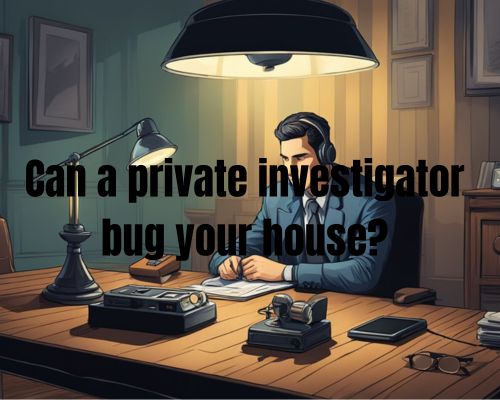Private investigators are often hired to gather information about a person or a group of people. They may be hired by individuals, businesses, or attorneys to conduct surveillance or investigate a particular case. However, there are certain legal limits that private investigators must adhere to when carrying out their work.
One question that often arises is whether a private investigator can bug your house.

The short answer is no, a private investigator cannot legally bug your house without your consent. Federal and state laws prohibit the use of electronic eavesdropping devices without the consent of at least one party involved in the conversation. This means that if a private investigator wants to record a conversation, they must obtain the consent of at least one person involved in the conversation.
It is important to note that while private investigators cannot legally bug your house, they can conduct surveillance in public areas. This means that if you are outside your home, a private investigator can legally observe and record your actions. Additionally, private investigators can legally gather information from public records, such as property records, court records, and other publicly available information. If you are looking for a professional PIs look for Private Investigator near me.
Legality of Surveillance by Private Investigators
Private investigators are hired to gather information about people, businesses, groups, or locations. However, they must follow strict rules and regulations to avoid breaking local or state laws and causing undue harm to the subjects that are under investigation.
Understanding Consent and Privacy Laws
One of the most critical aspects of surveillance by private investigators is obtaining consent. In most cases, consent is required from at least one party involved in the conversation or activity being recorded. In some states, all parties must give their consent before recording can take place. It is essential to understand the consent and privacy laws in your jurisdiction before conducting any surveillance. See Private Investigator near me.
State and Federal Wiretapping Regulations
Wiretapping is the act of intercepting and recording telephone conversations without the consent of at least one of the parties involved. State and federal wiretapping regulations prohibit private investigators from engaging in this activity without proper authorization. Violating these regulations can lead to severe legal consequences, including criminal charges.
Trespassing and Property Rights
Private investigators must also respect the property rights of others. Trespassing is not only illegal but can also lead to the evidence obtained being thrown out in court. It is important to understand the laws in your jurisdiction regarding trespassing and property rights before conducting any surveillance.
Methods and Tools for Investigation
When it comes to private investigation, there are various methods and tools that can be used to gather information. In this section, we will discuss some of the most common techniques and equipment that private investigators use.
Surveillance Techniques and Equipment
Surveillance is one of the most common methods used by private investigators to gather information. This involves observing and monitoring the activities of a person or group of people. Private investigators may use various tools such as binoculars, cameras, and audio recording devices to conduct surveillance.
Electronic Monitoring and GPS Tracking
Electronic monitoring and GPS tracking are also commonly used by private investigators. This involves using electronic devices to monitor a person’s activities and movements. GPS tracking devices can be attached to a person’s vehicle or personal belongings to track their movements.
Technical Surveillance Countermeasures (TSCM)
Technical Surveillance Countermeasures (TSCM) is a process used by private investigators to detect and remove hidden surveillance devices. This involves conducting bug sweeps to search for hidden cameras, listening devices, and other electronic surveillance devices.
Private investigators may use various tools to conduct TSCM. These tools include radio frequency detectors, thermal imaging cameras, and spectrum analyzers.
Private investigators have a range of methods and tools to conduct investigations. However, private investigators must follow strict rules and regulations. This is to avoid breaking local or state laws and causing undue harm to the subjects under investigation.
